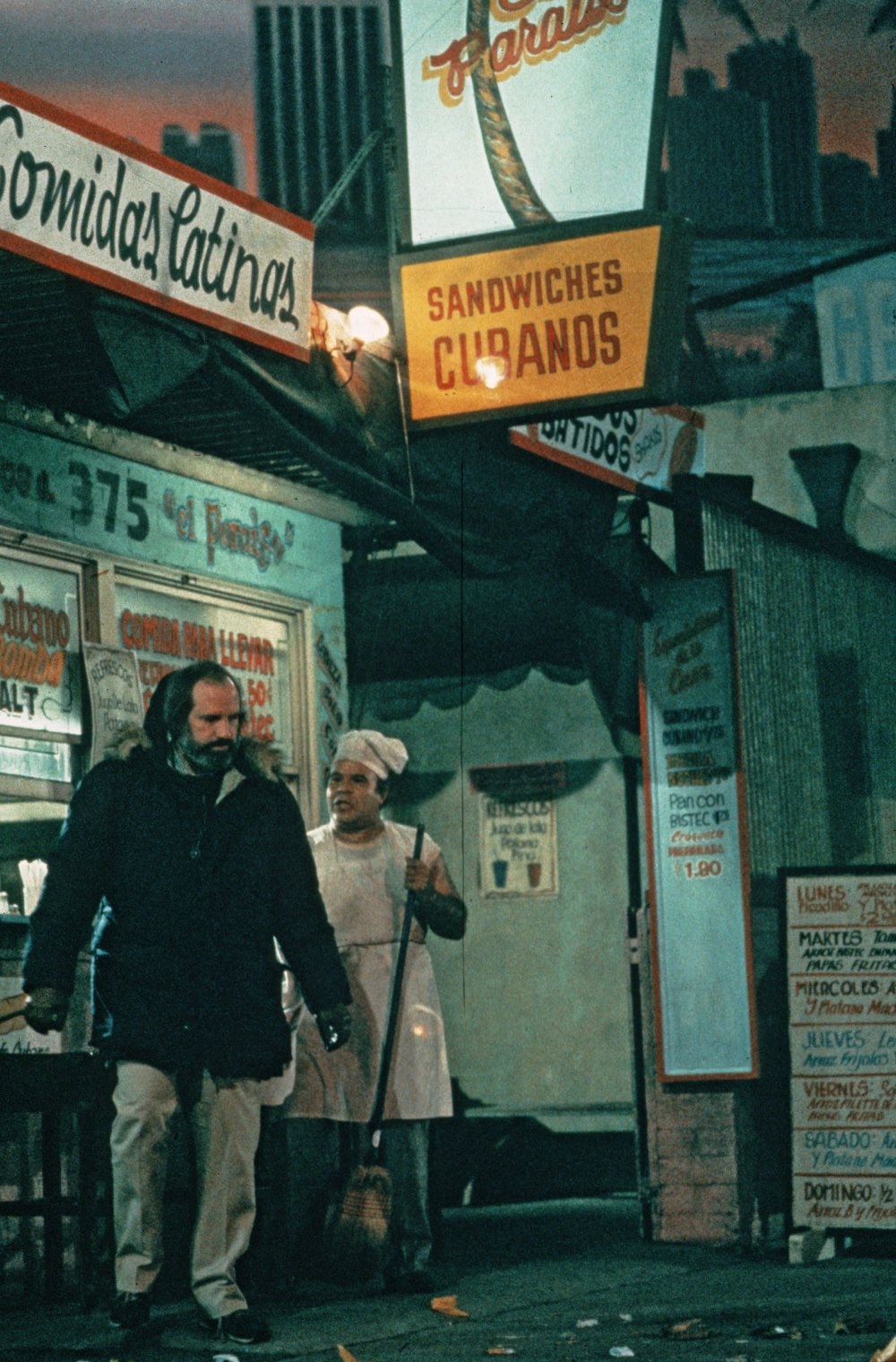AS GRACE GOES FROM FIERCE INDEPENDENCE, TO MADNESS, TO ADOLESCENCE
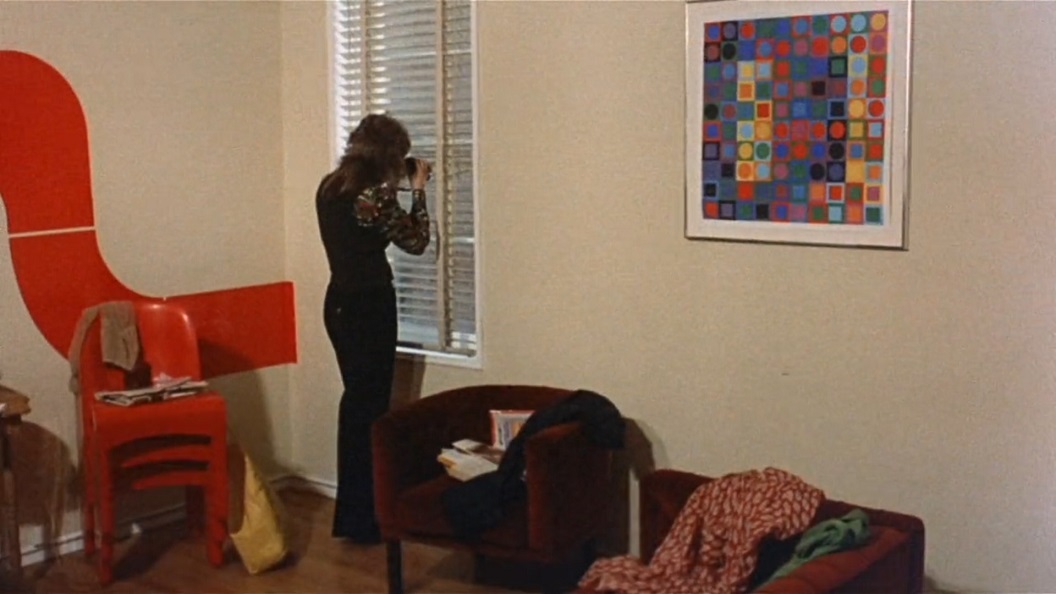


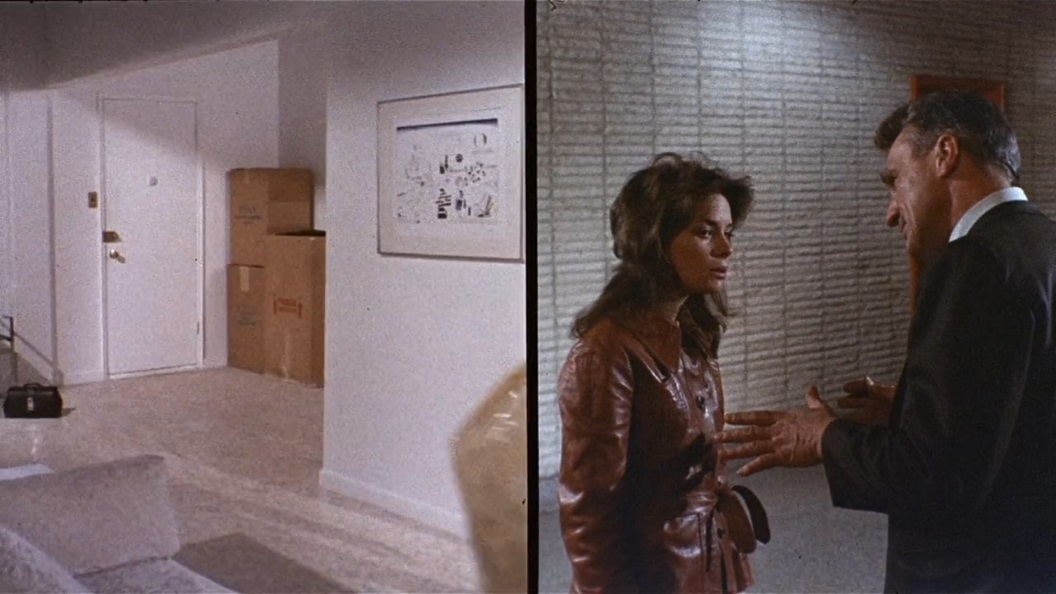












Updated: Sunday, October 18, 2020 11:04 AM CDT
Post Comment | Permalink | Share This Post
 Hello and welcome to the unofficial Brian De Palma website. Here is the latest news: |
|---|
E-mail
Geoffsongs@aol.com
-------------
Recent Headlines
a la Mod:
Listen to
Donaggio's full score
for Domino online
De Palma/Lehman
rapport at work
in Snakes
De Palma/Lehman
next novel is Terry
De Palma developing
Catch And Kill,
"a horror movie
based on real things
that have happened
in the news"
Supercut video
of De Palma's films
edited by Carl Rodrigue
Washington Post
review of Keesey book
-------------
Exclusive Passion
Interviews:
Brian De Palma
Karoline Herfurth
Leila Rozario
------------
------------
| « | October 2020 | » | ||||
| S | M | T | W | T | F | S |
| 1 | 2 | 3 | ||||
| 4 | 5 | 6 | 7 | 8 | 9 | 10 |
| 11 | 12 | 13 | 14 | 15 | 16 | 17 |
| 18 | 19 | 20 | 21 | 22 | 23 | 24 |
| 25 | 26 | 27 | 28 | 29 | 30 | 31 |
De Palma interviewed
in Paris 2002
De Palma discusses
The Black Dahlia 2006

Enthusiasms...
Alfred Hitchcock
The Master Of Suspense
Sergio Leone
and the Infield
Fly Rule
The Filmmaker Who
Came In From The Cold
Jim Emerson on
Greetings & Hi, Mom!
Scarface: Make Way
For The Bad Guy
Deborah Shelton
Official Web Site
Welcome to the
Offices of Death Records

















Earlier today, the band posted the above pic of Pino Donaggio and Brian De Palma on the band's Instagram page. "We fell for Pino’s work," the band wrote in the Instagram post, "as we toiled away to get our cover of his score for Carrie, for the release of @vikingguitarproductions Danse Macabre VII."
The Carrie medley consists of four parts:
I. Theme from Carrie
II. Bucket of Blood
III. School in Flames
IV. For the Last Time, We'll Pray
“Bernard Herrmann had just passed away and Brian was looking for someone to work on Carrie's music (1976): he didn't want any other American musicians and he chose me after seeing Roeg's film,” Donaggio said. However, there are some substantial differences between his musical style and that of the famous composer of the music of many Hitchcock films: "While Herrmann immediately prepared the audience for the tension, I preferred to relax the audience at the beginning and then give the sudden musical hit to make people jump out of their chairs, just like the scene where Carrie's hand comes out of the grave.”The successful collaboration lasted for eight films and allowed Donaggio to work with many other great directors (among many: Dario Argento, Liliana Cavani, Pupi Avati). "The luck I had in America is due precisely to the type of film that De Palma made, where there was little dialogue and the scenes were mainly accompanied by music, which thus had the opportunity to emerge," added the Maestro, also recounting the working method used during the compositions for De Palma: "For all the films of the early years I wrote the music in Italy and De Palma listened to all the work only later, after I had already composed everything: every time in the evening before I was very anxious, as if I had to take an exam. Luckily it always went well. Now it doesn't work like that anymore. There are demos and auditions. With Passion (2012) and Domino (2019) he already knew what I was writing from the beginning."
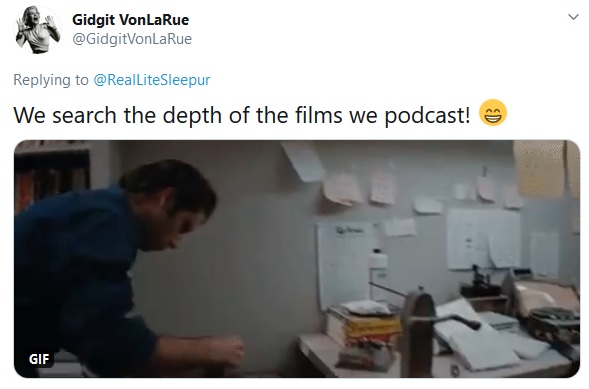
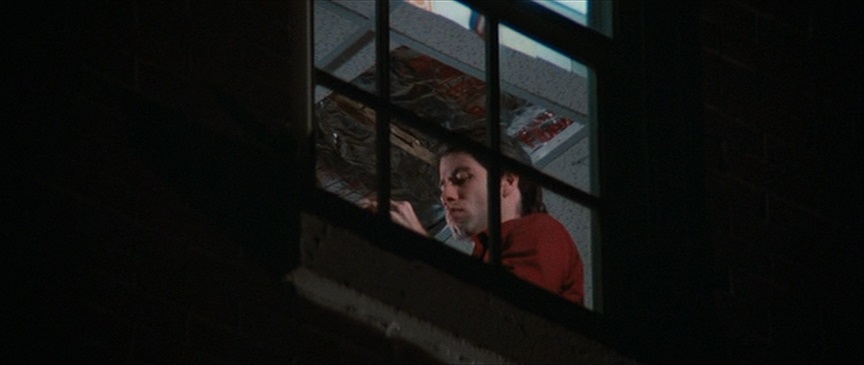
My job requires me to be open to all kinds of movies, but if asked about my favorites I will not hesitate to say the paranoid thrillers of the 1970s.The implosion of Richard Nixon’s presidency looms in ’70s films. It’s even depicted in one of them, Alan J. Pakula’s “All the President’s Men.” The loss of faith in government, cynicism about the presidency, fear of the impact a few powerful people can have on public policy and suspicion that the official version of events isn’t true — these are all legacies of an era in which Americans saw a disgraced president resign and his henchmen go to the slammer.
The most trusted people in our country were lying to us. Of course we were paranoid, and the movies are always best when they tie into something audiences already feel.
This explains why so many ’70s movies feature a protagonist who stumbles on a secret that leads to a vast government conspiracy. Besides reflecting the times, these stories offer freedom for a director to reshape material according to his style and interests. But the key is how closely the hero’s journey mirrors our own as moviegoers.
Just like the guy who finds a secret file or overhears a clandestine phone call, we begin a movie knowing little about what we will encounter, and soon (if the movie is good) it engulfs us completely. These films make us part of the conspiracy; we’re safe in our seats while the heroes risk their lives to get at the truth. Like the shadowy government figures who tap their phones or pull their children aside on the playground to issue warnings, we are always watching. Even more than other kinds of movies, paranoid thrillers make us aware that we’re voyeurs, dying to find out what happens to Gene Hackman or Warren Beatty.
For this list, I would stretch the definition of “the 1970s” to include 1981’s “Blow Out.” It belongs to the ’70s, culturally, because of its connection to earlier movies, its government conspiracy theme and its origin in events such as Watergate (and the Chappaquiddick incident in 1969). The voyeuristic “Chinatown” (1974), while not set in the post-Watergate years, is also clearly a product of them.
“Chinatown” establishes a link to earlier movies, too. I won’t go so far as to push the extended dates for this list back to the 1940s, but paranoid conspiracy thrillers are the answer to the film noir of the ’40s, equally dark tales that also focused on lone wolves attempting to solve mysteries that were bigger than they realized.
No medium does suspense and danger better than the movies, so I’m surprised paranoid thrillers are not more common. “The Lives of Others” (2006), the electrifying “Tinker Tailor Soldier Spy” (2011) and Will Smith’s “Enemy of the State” (1998) are more recent versions, but I still return to these classics often.
Blow Out (1981)
When I tell people this is my favorite movie, they’re often baffled. Its reputation has grown since it bombed in theaters, but some dismiss it as a garish knockoff of Michelangelo Antonioni’s “Blow-Up,” and director Brian De Palma is spoken of as a Hitchcock imitator, if at all. But the movie is a masterpiece, with great performances (John Travolta as a principled sound technician, Nancy Allen as a kind woman with a major clue and John Lithgow as a creep involved in the assassination of a governor), operatic emotions, suspenseful set pieces, a gleeful parody of slasher films and double-your-pleasure paranoia: Travolta slowly assembles a film of the assassination even as we are watching a film about it.

On the podcast's Instagram page, the episode is promoted with the image above, which shows a hand-painted Raising Cain glass credited to Pour Decisions by Carol.
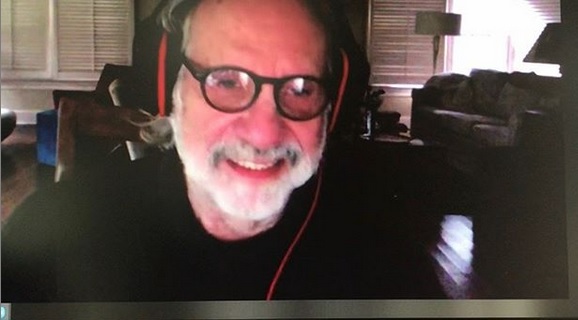
Glennie interviewed Martin Scorsese last month via Zoom for the book, a "Making of Raging Bull" from Coattail Publications, in collaboration with Robert De Niro. If you register your interest in the book at the bottom of the Raging Bull page, you'll get on their email list and can then recieve a 10% discount when the book is released.
In an American Cinematographer review of the 2009 Blu-ray release of Raging Bull, Kenneth Sweeney quotes Scorsese from one of the disc's extra features: "When I was preparing for the picture, Walter Bernstein took me, with Jay Cocks and Brian De Palma, to the fights at Madison Square Garden for the first time. We sat all the way up in the seats, way up. Walter was sort of talking me through the fights — what was happening and such, and it was very hard to tell what was happening. Then I realized…I don’t know how to shoot two guys in a boxing ring! I just don’t know how to shoot it. De Palma looked over at me at one point and said, 'Good luck.'"

Brian De Palma's Phantom of the Paradise, which he wrote and directed, brings those ideas into the present day (i.e., the early 1970s). Mega-successful Swan (Paul Williams) recognizes the talents of unknown composer/singer Winslow Leach (William Finley) and promptly steals them, intending to discard Leach and take personal credit for his incredible work.Differing from past big-screen versions, De Palma makes Swan the lead character; he's evil, sure, but he's also charismatic, has a great smile, and does certain things very, very well. (For example, we see him in the studio, punching up a voice track featuring Winslow's horribly disfigured vocal chords with the graceful dexterity of a magician; he knows what he's doing.) Swan is a different kind of monster, one that reflects the era: as powerful as he appears to be, he's still answering to a higher power yet, one that is even more diabolical, yet remains unseen.
The film remains rather fabulous; its sly, satiric side has aged well, and its happy mocking of the theatrical rock and rock stylings of the day bring back a lot of memories. Somehow, what stands out most for it is the introduction of Jessica Harper, who is more than fabulous: she is a star.
The character is a mainstay in Phantom movies; here, she is called Phoenix, which may be too on-the-nose, but it's a perfect description of her personality, as she performs songs beautifully, boldly dances across the stage like Mick Jagger, and reveals hidden depths to a woman who is seduced by stardom. (Our own Zach Gayne talked with Ms. Harper about the film, which is worth another read or two, and reminds me that my own current hometown served as a key location.)
Fitting nicely into De Palma's oeuvre between the slashing horror flick Sisters (available to stream on The Criterion Channel and considered on Blu-ray by our own Michele 'Izzy' Galgana) and the lushly unsettling Obsession (which I loved more than Ms. Galgana), the playful pop force behind De Palma's Phantom of the Paradise makes it an enduringly alluring tale of monsters, especially the ones who have all the power and don't really know what to do with it, except boost their own forgettable careers.
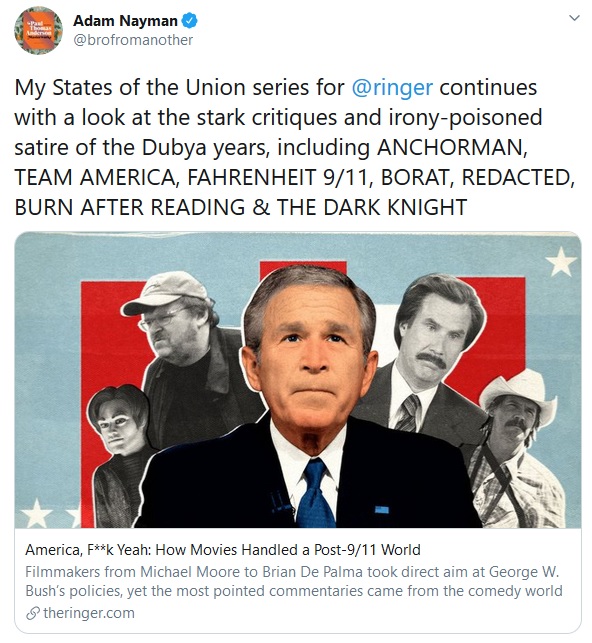
[Steven] Spielberg was one of several reigning elder statesmen to weigh in during the Bush era, most powerfully in his heavy-artillery remake of War of the Worlds, which envisioned America under attack before reversing the terms of the metaphor to suggest that the Martians and their machines had a distinctly imperialist appearance. Martin Scorsese’s Gangs of New York was gestating for a decade before its completion in 2002, at which point its NYC creation myth had extra resonance (and its own subtle World Trade Center cameo). In The Departed, Scorsese had Alec Baldwin’s shady Boston cop Captain Ellerby invoke the Patriot Act (“I love it! I love it!”) as a symbol of ostensibly good guys doing very bad things.Unsurprisingly, the ’70s survivor who confronted Iraq head-on was the indomitable Brian De Palma, whose Redacted adopted the same polemical hybrid of style as Moore, Cohen, and Range. The film is loosely based on a true account of U.S. military personnel raping a civilian girl, and unfolds as a series of video diaries, surveillance tapes, and YouTube clips that replicates an entire online multimedia landscape around recreations of the horrific event at the story’s center. By returning to the incendiary approach of his sardonic anti-Vietnam films Greetings and Hi, Mom!, De Palma transformed the recency of an ongoing catastrophe into an artistic strategy. Redacted proved so controversial that its producers insisted on recutting it for its New York Film Festival premiere, leading to a war of words with a filmmaker unafraid of biting the hand that feeds him. At one point, De Palma volunteered to buy the movie back and release it un-redacted, at once savoring and savaging the irony of the situation.
As images of distress go, Redacted’s photo-realistic final tableau of a broken, bloodied casualty of war was true nightmare fuel, while Paul Haggis’s money shot in 2007’s other major Iraq War movie, In the Valley of Elah, was constituted of simplistic semiotics: an American flag turned upside down. The film’s tale of a father learning the hard truth about his son’s activities while overseas earned Tommy Lee Jones an Oscar nomination for Best Actor, although he was better that year in a different role—as the reactionary, benevolent, and finally ineffectual sheriff in Joel and Ethan Coen’s No Country For Old Men. The film’s long, clean narrative lines, biblical severity, and setting in Bush’s old gubernatorial stomping grounds begged the questions of whether or not the Coens had instrumentalized Cormac McCarthy’s drug-runner thriller into a State of the Union address; critic Jonathan Rosenbaum interpreted the movie’s “gorgeous carnage” as an indirect mediation on the violence of the Iraq War.
No Country was a hit, but the Coens’ more incisive Bush-era commentary was their follow-up Burn After Reading, a delirious mashup of screwball stupidity and cloak-and-dagger paranoia featuring John Malkovich as a past-his-prime spy struggling to adapt after the thaw of the Cold War. It’s a funny movie set in a cruel universe: Its best scenes feature J.K. Simmons and David Rasche as CIA operatives performing a heartless, hilarious audit of the story’s ever-escalating body count—a callback to Dr. Strangelove minus the apocalyptic ending. Even as the film’s seemingly anachronistic analysis of tetchy (if hypothetical) U.S.-Russia collusion proved eerily prescient a decade after the fact, the dismissive dialogue in the movie’s ruthless coda couldn’t help but connect to cycles of foreign-policy fuckups and the political buck-passing that went with them.
“What’d we learn, Palmer?” queries Simmons’s high-ranking intelligence agent to his underling.
“I don’t know, sir.”
“I don’t fucking know either … I guess we learned not to do it again.”
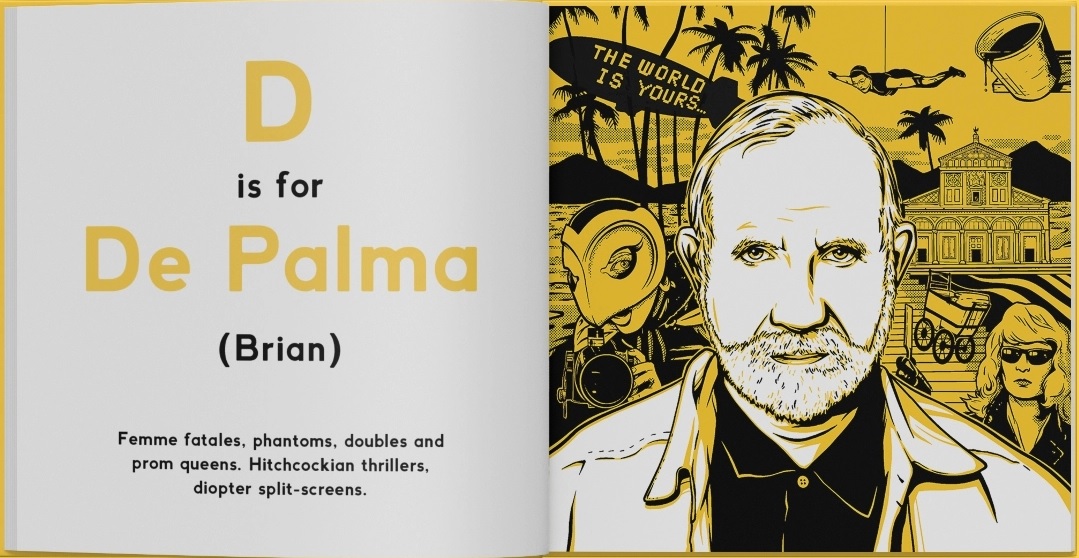
"A is for Auteur is officially described as a 'beautifully-crafted alphabet book to inspire the next generation of cinephiles,'" Taylor writes in the post. "It features 'references to more than 200 films from Alfred Hitchcock to Agnès Varda,' told in the style you’ve come to know and love from the card game. I’ve read the book and it’s incredibly fun and charming, with gorgeous illustrations and told in a sing-song-y nursery rhyme style that is perfect for leaving an impression on your budding movie lover."
Taylor then adds, "Along those lines we are also thrilled to debut an exclusive page from the book devoted to living legend Brian De Palma, who recently celebrated his 80th birthday. I mean, is that awesome or what?"
